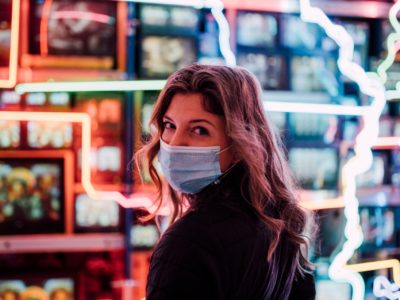It all began in 2020. We faced shutdowns, quarantine, rising death tolls, and a pervasive feeling of uncertainty. We bide our time day to day, hoping for a bit of good news to ease our worry. Between vaccines, boosters, respirator masks and the like, we genuinely feel safer. However, the pandemic still poses great risks.
Here are five reasons you should still be careful about COVID.
1. COVID puts some folks at a higher risk than others

Beginning early last year, long-awaited vaccine distribution vastly improved safety for the majority of Americans. But pandemic life proves a bit more complicated for the immune compromised and those who take care of or live with them. Vaccines offer less protection to those with weakened immune systems; some must forgo them entirely to avoid an adverse reaction. Cancer patients, organ donation recipients and those in treatment for autoimmune disorders, among others, make up most of this population. Drug therapies for these patients, like chemotherapy, anti-rejection drugs and a class of medications called biologics intentionally suppress the immune system. Though the introduction of treatments like these revolutionized medicine, they impair a patient’s ability to produce antibodies, which renders vaccines far less effective – even harmful. As a result, immune compromised folks struggle to fend off infection without a helping hand.
“Pretty much everyone in my family is disabled,” University of Kentucky senior Megan Maverick said. “One family member has multiple immunocompromising disabilities and another has cancer. We’re all vaccinated, but those two are at much greater danger than me.”
For most, taking normal precautions suffices, but people with immunocompromised family members act with greater care to protect their loved ones. Though Maverick’s risk of severe infection remains low, people like her need to ensure their loved ones’ continued health. This means staying indoors more often than not, masking everywhere they go and isolating for days when needed. Their loved ones live with a high chance of serious illness and death, adding uncertainty and fear to their day-to-day survival. Keeping them in mind when outside the home proves one way we make an effort to ease their burden.
2. Even if you’re fully vaccinated, immunity from vaccines only lasts so long.

Conclusions about the exact length of time vaccines protect us vary between manufacturers, but several recent studies on Pfizer’s shot showed maximum immunity lasted about 6 months after the initial double dose; after a booster, immunity started to wane significantly after 3 or 4 months. The body’s ability to resist COVID reflects, in part, how long ago someone received their injections. To make things even more complicated, current vaccines might not stand a chance in the event of a threatening new variant.
“The thing about viruses is that they mutate,” Albany Medical College graduate and retired nurse Kathy Smith said. “Vaccines work, and people need to get vaccinated if they can, but they’re probably not going to work forever. If COVID suddenly becomes a lot more deadly or contagious, we can’t be caught acting like everything is normal because we were vaccinated. It’ll be a disaster.”
Vaccines do prevent severe illness, relieve undue pressure on our healthcare system, and save lives. Most importantly, everyone eligible to receive them absolutely should. But they won’t stop COVID on their own. We should treat vaccines as one of many tools available to protect ourselves and others. In light of their flaws as well as their benefits, the best plan of action needs to include other tried and true preventive measures like regular testing, distancing and masking.
3. Some people who contract COVID experience symptoms for months, even after their infection runs its course.

A few months ago, new findings that the dominant variant du jour, omicron, causes less severe infection gave us much-needed hope. However, this virus’s most debilitating consequence still looms: long COVID, the syndrome characterized by coronavirus symptoms which persist long after infection. It often upends patients’ health and wellbeing for months or years. (No current evidence supports the claim that developing long COVID might be less likely from an omicron infection.) The effects of long COVID differ, sometimes, from those of the virus itself. They can turn out mild or severe, causing excruciating discomfort. Though its causes remain a mystery, new research draws similarities between the ailment and well-understood autoimmune disorders like multiple sclerosis, so some doctors consider it a new kind of autoimmune disorder.
“Your chest aches all day long,” University of Tennessee graduate Claire Hoppen said. “You might feel like you’re gonna pass out every time you stand up, or your heart is going to beat out of your chest, it’s going so fast.”
Some other symptoms can include shooting abdominal pains and brain fog that make you feel “like a zombie.” Others suffering from long COVID reportedly developed symptoms ranging from stomach upset to insomnia; long-term effects may also include permanent damage to the brain, lungs or kidneys. Keeping illness at bay becomes increasingly important when an infection could involve complications as serious as these. Before deciding to socialize, eat at a restaurant, or attend events in crowded places, take a moment to consider the risk.
4. Unlike those with long COVID, some people who test positive for COVID never show any symptoms.

As seen with long COVID, some people who catch coronavirus deal with brutal symptoms for a long period of time. On the opposite end of the viral spectrum, some experience few to no signs of the illness. These people remain totally asymptomatic, never realizing they contracted COVID in the first place. That may present the biggest danger of all thus far in the pandemic. Anyone could unwittingly carry COVID and transmit it to others, which presents a serious problem for slowing down this pandemic.
“As of speaking, near 1 million people have died [in the US] of COVID,” University of Kentucky senior Parker Van Houten said.
The death toll of this virus continues to climb higher and higher. That’s not to mention the number of serious cases which result not in death but in lengthy hospital stays. Obviously, your likelihood of spreading COVID rises if you are unaware you even carry it. But if you get tested on the regular – even when you think it’s overkill – you keep preventable hospitalizations and deaths from happening.
5. Above all else, COVID is simply unpredictable.

One day, we hear news of the latest, even better vaccine, or that the pandemic might calm down soon. The next? The headlines spell doom. We cannot predict the future. Hope will sustain us through the rest of this chapter, but we would look foolish to let hope evolve into wishful thinking or carelessness while we’re still in the thick of it.
“I truly believe we’re not out of the woods with COVID just yet. We had a big surge recently,” NICU Nurse at Albany Medical Center in New York Samantha Cleveland said. “We just don’t know what will happen. This is all uncharted territory. Saying, ‘I’m done wearing masks’ doesn’t make COVID go away, any more than ignoring cancer makes it go away. Just because you’re tired of it doesn’t mean it’s not still a big deal.”
If you feel burnt out amid all the protocols and procedures, it’s okay – we all are. But for now, it’s not time to hang up your mask just yet. Get tested routinely, take care of your health and remain considerate of others’ health too. With your help, we will turn the tide of this pandemic and bring it closer to an end.



















